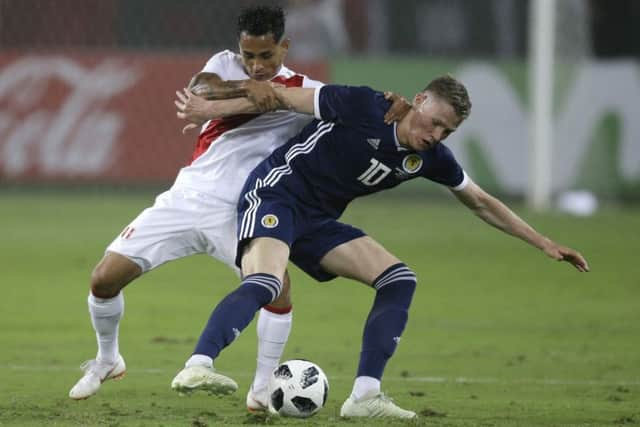Plenty perspiration but little inspiration in Peru defeat
The dancing feet of Jefferson Farfan are two major factors behind the World Cup fever that is currently gripping Lima and everywhere else in the country. Peruvians are anticipating a return to the global stage for the first time since 1982. Scotland’s exile grinds grimly on. The visitors’ discomfort on the ball in comparison to their hosts was plain to see.
Peru have ball players throughout their side, not just Farfan. Christian Cueva, the scorer of the opening goal from the spot, and Yoshimar Yotun, who created the second for Farfan.
Advertisement
Hide AdAdvertisement
Hide AdAll would come alive with the ball at their feet. Alex McLeish later noted Peru were handed a licence “to showboat some of their tricks” in the second half. Their confidence grew along with a contention this Scotland side wouldn’t score in a month of Sundays.


Of course, it was a shadow team McLeish was forced to send out into a testing environment. But still, it’s the failure to master the basics which is so worrying and damaging to Scotland’s own prospects of enjoying the kind of evening Peruvians were able to revel in two days ago.
Take Scotland’s one real chance of the night. It fell to Oli McBurnie, who spent the second half of last season scoring regularly for Barnsley. Here, however, that goal touch eluded him.
The chance was created following a fine move linking three of Scotland’s five substitutes. Lewis Morgan beat two men and transferred the ball to Callum Paterson. The Cardiff City player slung in a cross from the right which McBurnie failed to control as he tried to arrange his feet so he could strike the ball with his preferred right foot. McLeish’s take on what happened was interesting.
“Obviously we’d like to have a bigger threat at the other end, in terms of goal threat,” he said. “The one at the end, the great pass across the face of the goal. I don’t know if big Oli was unsighted but I was waiting on him swinging that left leg. Maybe a more experienced player would maybe have notched that. I’ve got to train that big guy to start using his left foot, because he had a chance at Hampden [v Costa Rica] as well and he came back on to his right.”
McBurnie was barely on the pitch for 30 minutes, so there are others more deserving of criticism. And it’s not McLeish’s fault that the striker struggles to shoot with his left foot. But it is indicative of the struggles of a once powerful football nation that someone lacking such a basic requirement as having the confidence to shoot with either foot has been identified as a new striking hope.
The Swansea forward won his third cap against Peru and McLeish is clearly a supporter. Crucially, the manager sounds willing to put the time and effort in to improving him. The hope is McBurnie returns the gesture by putting the work in at Swansea, or wherever he ends up next. Because, as it stands, he will struggle to make the grade at international level, when strikers have to learn to make the most of the one opportunity they might get in a game – as was the case in Lima.
McLeish was understandably delighted with the application. These players are working for him, that’s clear. Like Gordon Strachan before him, his demands for sweat and toil are being met. But of course that’s the least we can expect. It’s just that, on a trip to South America, the first visit for 40 years, it would have been nice to demonstrate that something of the old swashbuckling style survives along with Scotland’s age-old ability to make it difficult for themselves.
Advertisement
Hide AdAdvertisement
Hide AdMcLeish sounded slightly relieved afterwards. At 2-0 down after just 47 minutes, there was the potential for things to get a bit messy. But multiple substitutions combined with Peru’s wish to avoid picking up any unnecessary injuries meant the game petered out to a conclusion.
“The thing at the back of your mind is getting a doing,” said McLeish. “So we had to make sure that we were organised and made it difficult for Peru to function, with their greater creators. We did that to a degree. It’s a bit disappointing that we didn’t go in at half-time zero-zero. That was the only disappointment for me. Obviously the second goal came too soon in the second half as well.”
There was no point pretending. Scotland were beaten by the better, more technically proficient team. “If people expect us to win these games, then why do the bottom of the league team not beat Celtic every week?” asked McLeish. “Because there is a little bit of a gulf. But these guys have not done themselves any harm. We are where we are in terms of this trip. But I am so proud of them and looking forward to seeing the new ones coming in for the Mexico game.”
The Azteca stadium is another place where Scotland’s shortcomings are at risk of being pitilessly exposed.